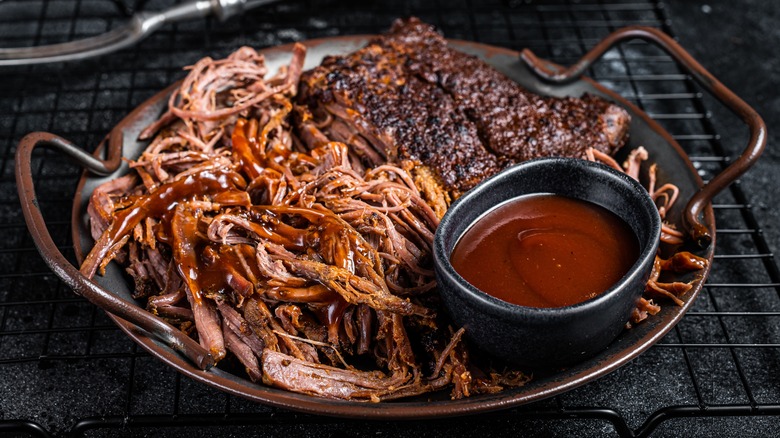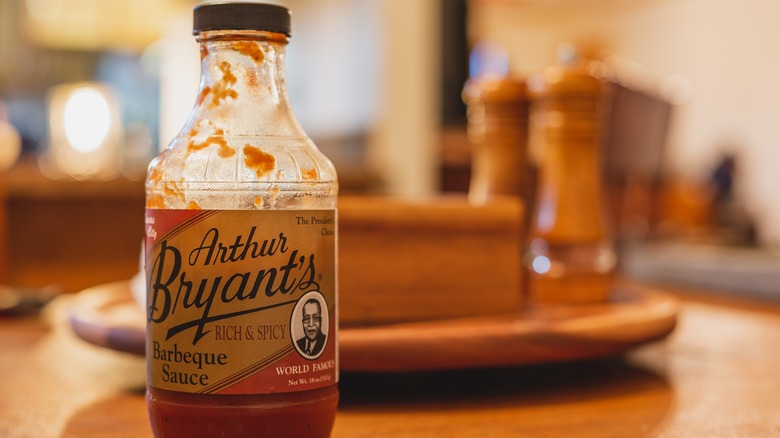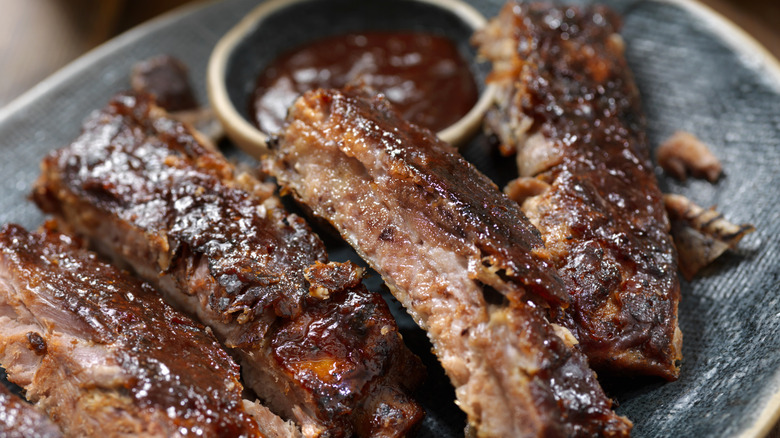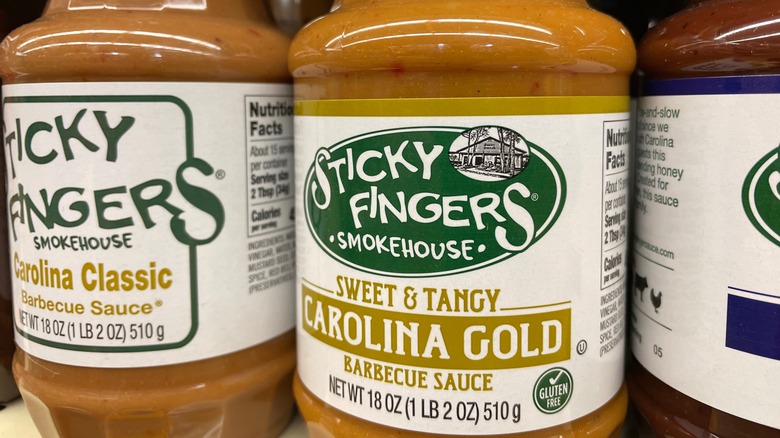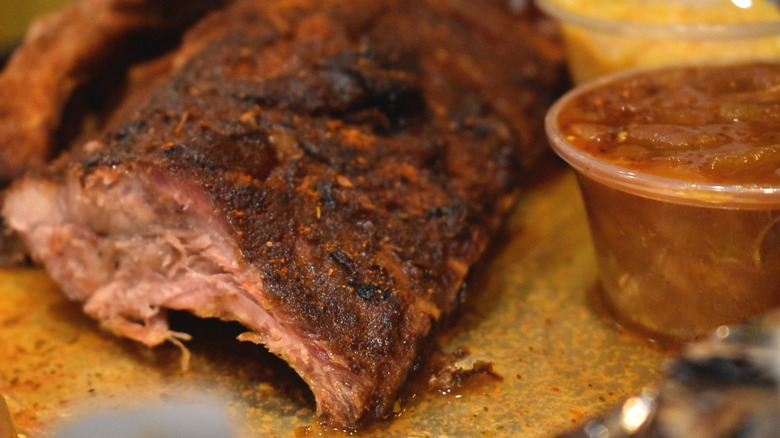How Do You Pair Wine With Regional-Style Barbecue Sauces? A Wine Expert Weighs In
While barbecue may have originated in the Caribbean, it's evolved over the centuries into what may be considered a truly all-American style of cooking. Fittingly enough, though, there's no one universally accepted style, but instead, a number of regional barbecue variants, each with its own distinctive sauce. While both beer and sweet tea are natural beverage pairings for most types of barbecue, wine connoisseurs like to match their favorite beverage with any kind of food under the sun, so needless to say, you can do wine with your 'cue, too. You do you, but before you do, we'd like to offer some advice from a sommelier to help you choose the best wine for each style.
Vajra Stratigos is not only a sommelier, but he also serves as the director of operations for the Colorado seafood chain Jax Fish House & Oyster Bar. Admittedly, there's no barbecue on Jax's menu (though there is plenty of wine), but this isn't Stratigos' only gig. He's also involved in overseeing the operations at Boulder's West End Tavern, and this establishment does offer barbecue dishes like St. Louis-style ribs, smoked brisket, and pulled pork. We put his expertise to the test by asking him to provide suggestions for wines to go with five different styles of barbecue sauce, and he came through with flying colors (both red and white).
Texas-style BBQ sauce
Texas has a rather diverse barbecue tradition all by itself, which is not surprising considering the size of the state. The style of Texas barbecue sauce we're talking about here, however, is the one known as mop sauce since it's brushed (or "mopped") onto the meat as it smokes. This sauce may be ketchup-based, although more vinegary versions also exist, and it's typically flavored with Worcestershire sauce and garlic.
As Vajra Stratigos says of Texas-style barbecue, "It's the depth, the sincere beefy-ness slathered with sweet and smoky combo that leans into the wood that's used to smoke the meat that's the trigger for me," and he goes on to rhapsodize about "the sticky hickory and mesquite creosote." The best wine to complement such a smoky sauce, he says, would be a syrah or shiraz, which are two types of red wine made from the same grape. Both wines, which Stratigos characterizes as "juicy" and "spicy," have the necessary boldness to stand up to the Lone State's beefy barbecue.
Kansas City-style BBQ sauce
Kansas City's barbecue sauce is what makes its regional style so unique. This condiment tends to be quite thick and is glopped on top of the meat rather than used as a baste or marinade. It generally has some type of tomato base with added brown sugar, vinegar, Worcestershire sauce, and spices to make for a sweet and tangy flavor, kind of like ketchup with a slightly smokier note.
Vajra Stratigos says that, for him, "The K.C. driver is all about reductive, stewed tomato with that distinctive, dense, often gooey richness that comes with promises of brown sugar sticky sweetness." He goes on to describe the sauce as "mouth-watering and nearly candied" and feels that, as far as wines go, "A similarly forward juicy red makes sense, so long as its complexity and structure are there." His top pick would be a cabernet franc, although he says that a South African pinotage might make for a serviceable second choice.
St. Louis-style BBQ sauce
St. Louis-style sauce starts out like the standard Kansas City-style condiment, but it adds an extra ingredient: cider vinegar, which gives it a tiny bit of apple-y tang. The extra vinegar also serves to thin out the sauce to some extent as well as cut down on a little of the sweetness. As a result, St. Louis' barbecue sauce leans slightly more toward the savory side than its Kansas City cousin.
While Vajra Stratigos characterizes St. Louis barbecue sauce as "another 'sweet-ish' or sweeter-than-not style," he feels that the cider vinegar "brings a sense of freshness and brightness that pushes the pure tomato flavor up and forward." It makes for a sauce he thinks is both leaner and more vegetal than the K.C. sauce. For this reason, he says, "If I was staring at a rack of St. Louis ribs and I wanted a killer wine, I'd go for something with plenty of fruit but perhaps a little more of that good vegetal vinous character." To be more specific, he would opt for a cabernet franc or carménère.
Carolina-style BBQ sauce
There are actually three different types of Carolina barbecue sauce. In North Carolina, you have both the vinegar-pepper kind that's so tasty with pulled pork plus the sweeter and more ketchup-y Lexington style (which comes from Lexington, NC, not the similarly-named city in Kentucky). In South Carolina, though, they're all about the Carolina Gold that gets its yellow color from mustard. Here, Vajra Stratigos is discussing the South Carolina sauce, so his wine recommendations apply to this more mustardy style.
As Stratigos says, "The mustard and sugar combination is an interesting one, [so] I'd think that a variety of wines could work here." He feels that either red or white wines could complement Carolina Gold, but at the end of the day, he'd go with the latter, opting for either a chardonnay (preferably a southern Burgundian one) or else a pinot grigio. The latter might be a good choice if you're hosting a backyard barbecue get-together since Stratigos points out: "With a varietal like pinot grigio, everyone is comfortable" while not everyone is a fan of more intensely-oaky chardonnays.
Memphis-style BBQ sauce
Memphis-style barbecue serves up its ribs (and yes, it has to be ribs) in two different ways, either dry or wet. With the former, you're mostly tasting the paprika-based dry rub, although the ribs will be brushed with a thin coating of sauce. If you want your ribs wet, though, you'll get a sauce that seems almost like a composite of all of the previously mentioned styles, as it not only has a tomato base but can also contain cider vinegar, brown sugar, Worcestershire sauce, and mustard.
Vajra Stratigos' take on Memphis-style barbecue seems to reflect the dry kind, as he speaks of it being "without all the sauciness and more of a direct shot to a rub and pure meat expression." In his opinion, it "wants something fruity but a smidge less forward and a bit more earthy and light in body." He suggests that gamays, pinot noirs, and unoaked tempranillos would all be suitable. He feels they have a sufficient amount of "restrained fruit and noticeable earthiness."

